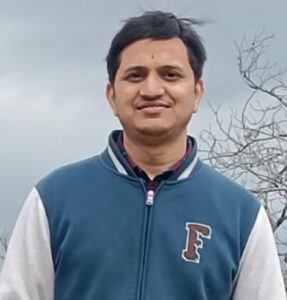Deepak Garg’s Interview
Starting date: 11.09.2023
Nationality : Indian
Implementing Partner : Jülich Center for Neutron Science
Main supervisor: Dr Yixi Su

Few words about you and your research project
I am Deepak from India. After completing my bachelor’s and master’s in science from the Kurukshetra University, Kurukshetra, India, I enrolled in Homi Bhabha National Institute, Mumbai, India for Ph.D. I carried out my Ph.D. research work at Bhabha Atomic Research Centre (BARC), the only nuclear facility in India. I also worked as a postdoc fellow at the Institute of Physics, Bhubaneswar, India. In my academic career, I qualified Joint Entrance Screening Test (JEST), National Eligibility test (NET-JRF), and Gradual Aptitude Test in Engineering (GATE) securing AIR-52, 98, and 169, respectively.
Through the GNeuS project, my research work involves the study of Kagome lattice based topological magnetic systems by employing physical property measurement system and advanced neutron scattering techniques.
My non-academic secondment will be carried out at Mirrotron Ltd, Budapest, Hungary, where I will be working on various aspects of neutron instrumentation such as the designing of an oscillating radial collimator, wide-angle polarization analysis, and the new chopper for the time-of-flight inelastic neutron scattering experiments.
What is your background? How have you heard about GNeuS?
During my Ph.D. research work at the Bhabha Atomic Research Centre (BARC), India, I utilized neutron techniques to get the microscopic and mesoscopic understanding of the negative magnetization and exchange-bias phenomena in rare-earth and transition-metal-based magnetic systems. The neutron experiments were carried out at powder diffractometers (PD-I and PD-II) and polarized neutron spectrometer beamlines located at the Dhruva reactor, BARC, Mumbai, India.
Details of my Ph.D. research work can be found at the following: link.
After my Ph.D. thesis submission, I emailed to Prof. Dr. Thomas Brückel, Former Institute Director of JCNS-2 and PGI-4, for a postdoc position under him. In reply to that email, he mentioned to me about the upcoming call no. 2 of the GNeuS project. I am grateful to Prof. Dr. Thomas Brückel for introducing me to this intriguing neutron project.
Why did you apply specifically on GNeuS?
The GNeuS program serves as an excellent platform to trained scientists in the field of neutron research. In my GNeuS project, I proposed to investigate the Complex Magnetism of Topological Systems using Polarized Neutron Scattering techniques.
Joining as a postdoctoral fellow under the GNeuS project aligns perfectly with my career goals as it has provided me an opportunity to learn and gain experience of the novel and advanced polarized neutron scattering technique.
Moreover, the GNeuS project facilitates global networking with neutron scientists all over the world and the non-academic secondment provides an opportunity to make industrial contacts.
What impacts do you expect from the GNeuS fellowship?
Research using an advanced and microscopic technique of polarized neutron scattering unambiguously provides a precise and in-depth understanding of the magnetism of a magnetic material.
In my Ph.D., I employed unpolarized neutrons to investigate the rare-earth and transition-metal-based magnetic systems.
However, through the GNeuS project, I will be using polarized neutron scattering techniques to delve into the complex magnetism of topological systems, thus broadening my expertise in neutron research. I strongly believe that the experience gained in this two-year global neutron program will potentially assist me in making a solid foundation in neutron research, thus serving as a backbone for my future career endeavors.
